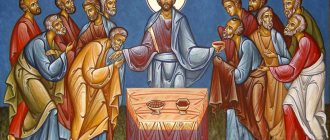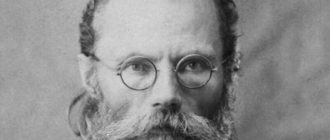Almost everyone wonders what the meaning of their life is, but this is not the only question that is relevant to people. Those brought up as Christians often wonder what the purpose of the Christian life is and, while this topic is indeed important, it is also quite interesting. Christian life is not just going to church, confession and communion, giving alms is something much deeper and it is this topic that is worth taking a closer look at for everyone who has ever asked the question raised above.
What is the purpose of the Christian life?
Addressing people in parables, Christ repeatedly emphasizes the idea that our earthly life has an important, unique meaning.
Such, for example, is the parable of the ten virgins waiting for the groom with lighted lamps (see Matt. 25:1-13). The groom delayed until midnight. But the wise virgins had oil in reserve for their lamps, and they met him with dignity and went with him to the wedding feast. The foolish virgins did not foresee that the groom would come late, and they did not store any oil. When they announced that the bridegroom was approaching, their lamps had already begun to go out. They went to the merchants to buy oil, and when they returned, they did not have time to meet the groom and then knocked in vain on closed doors.
While a person lives in this world, he can set the direction of his path in eternity. Beyond the threshold of death, he loses the ability to change - his spiritual development will continue in the direction of good or evil chosen during life. Therefore, the vector of our development in earthly life should be directed towards Christ - this is the most important thing. But how can this be done in practice? How, living in this difficult world, can one achieve the goal of Christian life?
This question haunted one Orthodox young man. He asked it to many people: those who were wise in life experience, those who had received theological education, and those who were ordained to the priesthood. In response, he heard the immutable truths that one must believe in God, pray, keep fasts, go to church, live according to God’s commandments, and do good deeds. Nevertheless, the young man did not stop and continued to ask. And only many years later the Lord gave him a comprehensive answer through His great ascetic - St. Seraphim of Sarov. The saint himself reminded him of this question and revealed the purpose of Christian life. The person who was lucky enough not only to meet the true lamp of faith on his path, but also to become his student, was Nikolai Motovilov, who recorded this conversation. The answer sounded very simple: “The true goal of Christian life is to acquire the Holy Spirit.”
Motovilov did not immediately understand the meaning of these words, and the Monk Seraphim explained that in the parable of the ten virgins, Christ calls our earthly existence a “marketplace,” and the business of human life is a “purchase” and says to everyone: “Buy until I come.” Throughout his life, a Christian should be engaged in “purchasing” (“acquiring”) the grace of the Holy Spirit—the oil mentioned in the parable—to maintain the lamp of his soul. To those who believe that this oil is good deeds, St. Seraphim objects that it is not for nothing that the parable is talking about virgins. Preservation of virginity is an equally angelic virtue, superior to all others. Both the wise and the foolish virgins were equally virtuous. But, in the figurative language of St. Seraphim, the foolish virgins did not receive “not a penny of profit” from their good deeds.
Any trader works to make a profit. The Monk Seraphim calls spiritual profit the gradual assimilation to Christ through the grace of the Holy Spirit. Acting like a merchant, a Christian must do good deeds in an effort to receive God's grace through them, which transfers him from a corruptible state to an incorruptible, deified state. Good deeds in themselves, if they do not increase the grace of Christ in a person, have no value. Healed by the grace of the Holy Spirit, human nature acquires the ability to exist eternally together with the Lord in His Kingdom.
Closed doors are death, blocking the path of spiritually untransformed people to the Heavenly Palace, where the Bridegroom, Christ, resides. He says to the foolish virgins: “I do not know you” (Matthew 25:12), because they do not know Him. This is an answer to Christians who in their earthly life were careless about spiritual gifts and did not strive to become like Christ. The Monk Simeon the New Theologian explains that in the future life a Christian will not be asked what good deeds he has done in earthly life and how many, but he will be carefully tested, with what state of spirit he performed them and “does he have any resemblance to Christ, like a son to his father."
The foolish virgins did not have any virtues in reserve, but rather the grace of God acquired through them. According to the explanation of the Monk Seraphim, they considered only the external, formal fulfillment of Christian duties sufficient, without caring about “whether they received the grace of the Spirit of God,” and lived their whole lives without knowing Christ.
Likewise, Abbess Arsenia (Sebryakova) lamented that, while fulfilling all the requirements of the monastery charter, many sisters of her monastery do not work on their inner state, “they do not look for, do not try to exterminate passions at their roots.” When asked by the abbess, “why are they not doing anything to save themselves,” these sisters were offended. After all, they were busy from morning to night with obediences and regularly read the monastic rule. But the abbess wanted their work to pursue the main goal - to have a constant aspiration towards Christ.
Difficulties along the way
Maybe something will not work out for some time, the wrong results will be shown, some competitions will be lost... But this will not stop someone who has a goal and strives for it. But for those who simply have this goal, but leave when difficulties arise, anything will stop them. This reminds us of a scripture.
... to everyone who hears the word about the Kingdom and does not understand, the evil one comes and snatches away what was sown in his heart - this is who is meant by what was sown along the way. And what is sown on rocky places means one who hears the word and immediately receives it with joy; but it has no root in itself and is fickle: WHEN TROUBLE COMES OR PERSECUTION FOR THE WORD, it is immediately offended. And what was sown among thorns means the one who hears the word, but the CONCERNS OF THIS AGE AND THE DECEPTATION OF WEALTH MUFFLES THE WORD, and it becomes unfruitful. (Matt. 13:19-22)
Difficulties with the Word. In order to fulfill It, you must endure (...you need patience so that, having fulfilled the will of God, you will receive what was promised...). It is necessary to believe (confidence in the unseen), to be faithful to death.
And we understand that the main goal of a Christian is not healing, not a million dollars, not food and clothing, not delivering our loved ones from drunkenness. Paul writes above ABOUT THE IMPROPERABLE CROWN. Further, he describes the same goal in a different way
… Brethren, I do not consider myself to have attained; but only, forgetting what is behind and reaching forward, I STRIVE TOWARDS THE GOAL, the HONOR OF THE HIGH CALL (the reward of the highest calling) OF GOD IN CHRIST JESUS. So, whoever is perfect among us MUST THINK THIS way; if you think differently about something, then God will reveal this to you . (Phil.3:13-15)
Make a choice
There is such a definition in logic - FORK. This is where it is presented. There are no other alternatives here. Jesus called for our words to be either “yes” or “no.” EVERYTHING that is above is from the evil one. Therefore, you need to make a decision and be honest with yourself.
WHO DO I LOVE and WHO DO I HATE????? I repeat - there is no other!!!!
What I care about and what I don’t care about. That's what it's called. And there are no other definitions.
In the poems of Pavel Shavlovsky there are the following words:
...a question briefly flies through my heart, making me shiver: “Who are you, where are you coming from?” Who are you?
The dull pain of recognizing “who I am,” the soul most painfully admits to the root of all suffering with the short phrase “I am a Jew.” And if this is not known, then I will answer:
- My people Israel are the chosen ones, I am the one who walked honestly before the eternal God all my life, year after year,
What good is it, now, hiding, running from everyone and myself, just because I don’t agree with God...
and in the Word of God there are such lines
… Test yourselves to see if you are in the faith; examine yourselves. Or do you not know yourselves that Jesus Christ is in you? Unless you are what you should be . (2 Cor. 13:5)
Jesus Christ. The story of life, death and resurrection
The essence of Christianity lies not only in its teachings, but in the very belief in the divinity of Christ. Almighty God sent his child to earth. Jesus faithfully preached throughout the cities of Judea and received the nickname “Son of the Living God.” The Jewish authorities were zealous for the purity of teachings and opened a hunt for the peaceful wanderer.
The glory of Christ walked among people day and night. On the eve of Passover in the 30th year, Yeshua reminded Judea of himself. A week before the celebration, he resurrected the dead Lazarus.
The indignation of the high priest was unimaginable and led to the fact that Christ was recognized as a dangerous preacher. On Thursday evening, Jesus was captured, at the instigation of the traitor Judas, and executed the next day. According to the laws of Judea - for blasphemy and rebellion.
Pontius Pilate, the Roman governor, conducted proceedings in the case of Yeshua and was even ready to release the anointed one, but Caesar’s friends did not allow him to do so. The right to release Christ in honor of Easter was neglected. Israel rejected Jesus.
The news of Jesus' resurrection swept Rome and later the entire empire.
The main tenets of Christianity
This religion is historical, which means its faith is based on the events described in the sacred letter of the Gospel. Four books of “evangelism” tell about the birth, life path, execution and resurrection of Jesus Christ.
The resurrection of Jesus Christ was truly good news: the apostles, the messengers of the risen Son of God, told the people about it for enlightenment and baptism. Resurrection is the guarantor of an infallible path that aims at victory over death, the life of the coming century.
Christianity preaches not only the immortality of the soul, but also the body. The resurrection will happen to everyone, but not everyone will be honored with life next to God in the Kingdom of Heaven, which means bodily resurrection is not a sign of imminent bliss. After the Second Coming, Jesus Christ will personally lead them to the Last Judgment. The purpose of the court is not to punish sinners, but to select. People are imperfect, cowardly and evil - unworthy of the original image of creation.
The embodiment of happiness and rapture in Christianity are people who have renounced earthly blessings in the name of the Lord: peacemakers, the poor, the merciful. Followers of the Son of God are not afraid of reproach and expulsion.
Christianity teaches the ideal purpose of man in the world, the dominance of the spirit over the mortal, the achievement of harmony between the sacred and matter, and conveys a small part of God’s lofty plan.
Conclusion
If you cannot answer the questions: “Who am I”; "Where am I going"; “What is my calling,” then regardless of your age today, we can assume that you do not perceive yourself as a single whole. Why? The reasons may vary. The main one is that for the most part we live a little conscious life, we are simply carried along with the flow until we encounter obstacles in the form of whirlpools and traffic jams (crises in the personal and professional sphere), overcoming which we or move to a new level awareness or drowning. The sooner we set goals for ourselves, taking into account our characteristics, the higher the likelihood of success at work and in the personal sphere.
What is Christianity? Definition of this concept
Christianity is a religious doctrine based on faith in the son of God - Jesus Christ. Christianity in our time is the largest religion in the world. In terms of numbers, this world religion includes about 2.5 billion adherents.
3 main types (directions) in Christianity
- Orthodoxy;
- Catholicism;
- Protestantism. For a brief description of these types, see the article below.
Already at the beginning of the 5th century, the Christian faith came to every state. The Orthodox became an elite with an enviable position and influence. With popularization came persecution. Caesar Galerius called religion an “infection” and became the culprit of harsh mass repressions. Thousands of martyrs died, but the persecution eradicated itself. Governors and military men themselves resorted to Christianity, and the measures taken did not add to the order of the empire. Galerius gave the go-ahead for the existence of the faith of Jesus. Only in 311 did it receive official status. Now the rulers themselves became adherents of the religion, spreading it to the masses, making it world famous and significant.
The time stream and the people themselves divided the original Christianity into Catholicism, Protestantism and Orthodoxy. Numerous reforms and restructurings of religion in states have made adjustments to directions, but they are united by one great plan and creed.









